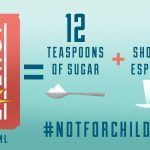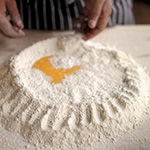School Food Matters founder Stephanie Wood explains why we need a healthy rating scheme for all schools, and the benefits it would bring.
In 2007 I went on a crusade to improve the school meals at my children’s school. Along the way I picked up hundreds of concerned parents from across two London boroughs – and School Food Matters was born.
What does good look like?
Thanks to a lively School Food Matters campaign, children at 60 primary schools now enjoy high-quality, tasty school meals delivered by talented school cooks, and supported by a contract caterer that cares.
The benefits to children go beyond the plate; the caterer also offers schools funding and training to help them teach kids about growing food.
Across the country, I see great examples of headteachers, cooks and caterers working together to support children to keep themselves happy and healthy. What they’re not terribly good at is spreading the good news!
How can other schools join in?
We need a more universal framework to help all schools improve their food and health standards.
Some charities run award frameworks to celebrate and shape the good work of schools, but currently no-one from the government officially monitors school meals or what children are taught about food.
What can the government do to help?
Help could be on the horizon in the shape of the government’s proposed healthy rating scheme for schools.
Promised in the Childhood Obesity Plan in 2016, the scheme is a chance to encourage all schools to get stuck into healthy initiatives, and to showcase the schools who are succeeding.
The government’s plan is to weave the scheme into Ofsted inspections so that it is used as evidence of how a school supports pupils to live healthily. And if Ofsted is looking, heads and governors will engage; what gets measured gets done.
School Food Matters began as a parent campaign, so we understand the challenge some families face to establish good food culture in their schools.
With an Ofsted-monitored rating scheme in place, parents will have a good place to start.
What gets measured, gets done
If we’re to continue improving school food and teaching children how to keep themselves healthy, the government needs to measure progress.
The last set of data we have on school meal take-up is from 2012. Shouldn’t we be monitoring the numbers of children taking up the offer of a hot, nutritionally balanced school meal?
Back in 2007 I thought it was only my school that had a problem with school meals. I soon learned that, across the borough, only 26% of children were choosing a school meal so there was clearly a bigger problem to fix.
So, come on, Damian Hinds! Bring on that healthy rating scheme and celebrate the heads, cooks, caterers and local authorities that are delivering quality school meals and food education to hundreds of thousands of children every day.
And perhaps we can nudge those schools yet to see the light!
Stephanie Wood is the founder of School Food Matters, and is joining Jamie’s campaign for a universal healthy food rating for schools. Find out more about Jamie’s campaigns at Friday Night Feast.

















